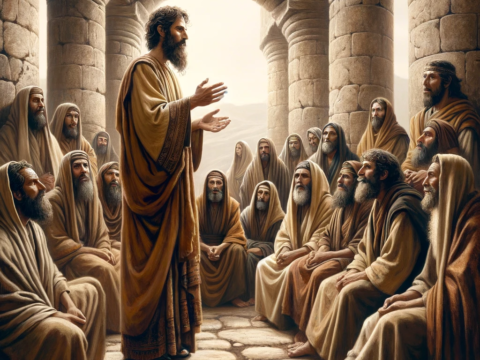Among the many books of the Bible, the Book of Romans is a book that contains information and explanations of the Gospel of Jesus Christ. It also gives us information on God’s invisible qualities which have been clearly seen since the creation of the world.
Romans Chapter 1: 1-25
1 Paul, a servant of Christ Jesus, called to be an apostle and set apart for the gospel of God— 2 the gospel he promised beforehand through his prophets in the Holy Scriptures 3 regarding his Son, who as to his earthly life[a] was a descendant of David, 4 and who through the Spirit of holiness was appointed the Son of God in power[b] by his resurrection from the dead: Jesus Christ our Lord. 5 Through him we received grace and apostleship to call all the Gentiles to the obedience that comes from[c] faith for his name’s sake. 6 And you also are among those Gentiles who are called to belong to Jesus Christ.
7 To all in Rome who are loved by God and called to be his holy people:
Grace and peace to you from God our Father and from the Lord Jesus Christ.
Paul’s Longing to Visit Rome
8 First, I thank my God through Jesus Christ for all of you, because your faith is being reported all over the world. 9 God, whom I serve in my spirit in preaching the gospel of his Son, is my witness how constantly I remember you 10 in my prayers at all times; and I pray that now at last by God’s will the way may be opened for me to come to you.
11 I long to see you so that I may impart to you some spiritual gift to make you strong— 12 that is, that you and I may be mutually encouraged by each other’s faith. 13 I do not want you to be unaware, brothers and sisters,[d] that I planned many times to come to you (but have been prevented from doing so until now) in order that I might have a harvest among you, just as I have had among the other Gentiles.
14 I am obligated both to Greeks and non-Greeks, both to the wise and the foolish. 15 That is why I am so eager to preach the gospel also to you who are in Rome.
16 For I am not ashamed of the gospel, because it is the power of God that brings salvation to everyone who believes: first to the Jew, then to the Gentile. 17 For in the gospel the righteousness of God is revealed—a righteousness that is by faith from first to last,[e] just as it is written: “The righteous will live by faith.”[f]
God’s Wrath Against Sinful Humanity
18 The wrath of God is being revealed from heaven against all the godlessness and wickedness of people, who suppress the truth by their wickedness, 19 since what may be known about God is plain to them, because God has made it plain to them. 20 For since the creation of the world God’s invisible qualities—his eternal power and divine nature—have been clearly seen, being understood from what has been made, so that people are without excuse.
21 For although they knew God, they neither glorified him as God nor gave thanks to him, but their thinking became futile and their foolish hearts were darkened. 22 Although they claimed to be wise, they became fools 23 and exchanged the glory of the immortal God for images made to look like a mortal human being and birds and animals and reptiles.
24 Therefore God gave them over in the sinful desires of their hearts to sexual impurity for the degrading of their bodies with one another. 25 They exchanged the truth about God for a lie, and worshiped and served created things rather than the Creator—who is forever praised. Amen.
Introduction
Probably the most important of Paul’s fourteen epistles, the Letter to the Romans contains the most systematic presentation of the doctrine of salvation in the Bible. Its many themes include salvation, sanctification, and righteousness from God.
It was written around 56-57 AD, while Paul was on his third missionary journey. He wrote his letter as a way to explain the Christian faith to Roman Christians. It would ensure that the gospel was preached in Rome.
In the letter, Paul emphasizes that justification is by faith alone. He points to two Old Testament prophecies that are fulfilled in Jesus Christ. He also uses the life of Abraham as an example of justification. Abraham was not justified by works of the law, good works, or religious rituals. Rather, Abraham was justified by faith.
The gospel is the power of God for salvation. It reveals the righteousness of God to those who believe. This is the basis for Paul’s preaching.
God’s invisible qualities have been clearly seen since the creation of the world
Despite being unwittingly ignored by ungodly humans, God has made his invisible attributes known to mankind. This is evident in the various works he has accomplished. Among them, the best known is the creation of a universe, planets, and stars. During the course of his work, he also created man and woman in his image. These creations are a wonderful means of revealing his character.
Although people do not appreciate God’s creation, they do appreciate the fact that he has made his invisible attributes visible. This is evident from Psalm 19, which describes nature’s testimony. This is the best and most important way that God has revealed himself to mankind. He is the author of creation and has the power to do wonders.
God also makes use of his creation in the form of speech and words. He uses human beings made in his image to talk to his creatures. He has created a world that transcends all cultural and gender limitations.
The rejection of the Jews has brought about the acceptance of the Gentiles
Among the many passages in the Book of Romans that talk about the rejection of the Jews, one stands out. Romans 11:11 is a good place to start. It is not the first thing that Paul will mention in the book. He mentions it in the middle of a discussion about spiritual life. He will then discuss the rejection of Israel in two main parts.
The first major point is that God’s rejection of Israel had no real negative effect on the Gentiles. Instead, God used the stumbling of the nation to bring salvation to the Gentiles.
The other major point is that God had a good reason to reject Israel. The reason is that the Jews did a bad thing. Instead of taking the package deal of salvation and vocation, they reduced it to a mere package deal of good works. The good news is that God will restore Israel to its full potential and then give the Gentiles a chance to accept Him.
The Gospel of Jesus Christ
Among the twenty-one epistles in the New Testament, the book of Romans is the most devoted to the Gospel of Jesus Christ. The purpose of the letter is to explain the Gospel to the Jewish and non-Jewish Christians of Rome.
The first section of the letter is devoted to Paul’s commitment to the Gospel of Jesus Christ. He gives his personal information in the opening chapter.
The Gospel of Jesus Christ involves God’s love and power for salvation. It is a life-changing message that changes the world and the churches. The gospel also brings forgiveness of sins, salvation from God’s wrath, and life in the Spirit. This is the power of God for salvation to all people, including the Jews and the Greeks.
Paul’s missionary work is well documented in the New Testament. He was called as an apostle. In his call, he was ridiculed in Corinth, laughed at in Athens, and stoned in Galatia. During this time, pagans mocked him and his followers.







